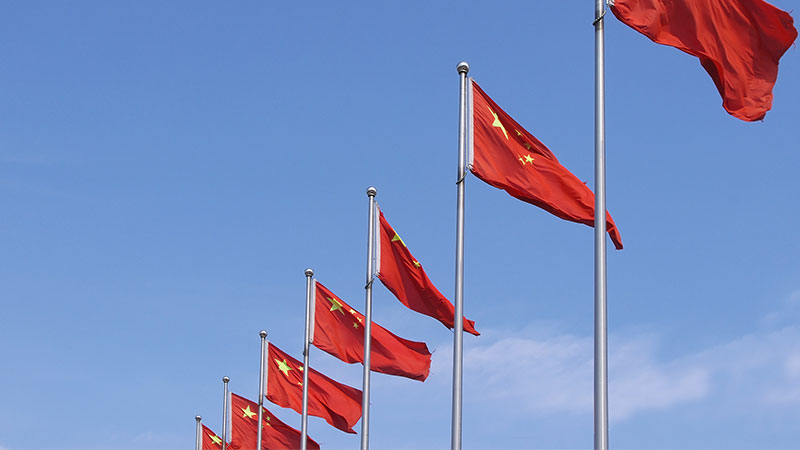Investment Topics

AI and local production plans drive the semiconductor industry
Artificial intelligence (AI) is currently the dominant topic in the technology sector. New, fast data centres require enormous investments. Microsoft and OpenAI recently announced that they will invest USD 100 billion in an AI data centre project.

Textile business in upheaval
The surprising change in management at Sweden's largest textile supplier and the restructuring measures initiated there are a wake-up call. After all, they show that the textile trade is still in a state of upheaval. While the coronavirus pandemic temporarily strengthened online-only providers in particular, aggressive pricing concepts are now gaining in importance in the wake of excessive inflation.

Where has the momentum gone?
Electric vehicle (EV) stocks have recently come under pressure - as have most companies in the battery value chain: in 2024 to date, for example, the share prices of the world's two leading EV producers have fallen. Up-and-coming, smaller listed companies have lost even more ground.

AI: There is a lot of potential for investors in the supply chain
When it comes to artificial intelligence, a lot of people say it feels like a new era was ushered in this year. Historically, similar breakthroughs happened roughly every ten years. If the pattern repeats itself, we are indeed witnessing the dawn of a new era.

China: Western pessimism is overdone
China’s economy has disappointed lately. The hoped-for turnaround after the abandonment of the zero-Covid-19 policy has so far largely failed to materialise. One reason for this is that mainland Chinese hardly received any support from the state during the Covid-pandemic.
China pessimism in the Western press and among Western investors has reached a record high.

Automotive industry: The calm before the storm
The automotive industry in Europe seems to have stabilised as supply chain problems and cost inflation due to the Covid-19 pandemic have eased. However, the shift towards electric vehicles is profoundly affecting the sector and presents challenges for traditional manufacturers.

Key industry for decarbonisation
Commodities have fared better in the past. But since the beginning of 2022, it seems, the worm has been in the wind. Production, profits and revenues of mining companies are falling, only costs are rising. But the sector is consolidating and a bottom is in sight. Moreover, the current mine supply cannot meet demand for some metals. This applies first and foremost to the key metal of decarbonisation: copper.

Cloud Computing – renting instead of (self-)making
In retrospect, 2006 was a decisive year for online retailing: the industry giant Amazon opened up its IT infrastructure, which until then had been used exclusively by itself, to other retailers and companies as a service. These "Amazon Web Services" include a broad range of different technical solutions that can be booked and cancelled according to individual needs. „Cloud computing" developed from this. In the following analysis, investors will learn about the complexity behind it, the opportunities that arise from it and which companies currently dominate the market.

Light at the end of the tunnel?
With inflation easing, a recovery of German equitites of the residential real estate sector is possible. Certainly, the interest rate turnaround at the ECB will still take time, but the increase of key interest rates are beginning to take effect. The easing of energy costs is also having a supportive effect. In this environment a 30 percent correction of real estate prices anticipated by the market seems exaggerated, especially as the housing shortage continues to worsen. New construction should remain at a very low level in the coming years, while the influx of refugees from Ukraine is continuing at record levels.
The comeback of bonds
For a long time, the asset class of bonds enjoyed great popularity among professional and private investors due to its broad stability and not infrequently served as risk mitigation and diversification in portfolios. However, inflation and rising market interest rates triggered a broad sell-off in the bond market this year, abruptly ending a bull market that had lasted for three decades.
Between recession and structural growth drivers Summary
With a recession looming, a short-term downturn in the semiconductor industry is probable, but this is unlikely to have much impact on structural trends as these trends are long-term drivers. Various forces are currently affecting the semiconductor industry, whose products are indispensable in many parts of the global economy. This situation is complicated: An improvement in supply chain problems meets recession concerns, and global tensions, particularly between the U.S. and China, are creating uncertainty. What investors should know now.

Promising, but not a sure-fire winner
Online commerce experienced a huge boost from the Corona pandemic. With the return of more normality, this growth is likely to slow down. However, the structural trend remains intact. Platforms are benefiting in particular, because network effects are the economies of scale of analog mass production in the digital world. When it comes to payment systems, banks are losing out, and the importance of cash is dwindling in favour of digital wallets.

A widespread disease from an investor's perspective
Obesity is on the rise worldwide and literally a burden not only for those affected. It is also a burden on the healthcare and social systems of national economies. Several promising new drugs are currently in trials or have already been approved and could make expensive stomach reductions obsolete.

A question of (price) discipline
Global automotive production typically grows at a similar level as the global GDP - yet we have seen a decoupling of this long-term trend since 2019. However, the growth prospects of the global automotive sector have not changed structurally, they have rather come under pressure due to a combination of different circumstances.

Structural trends are intact
For a long time, technology stocks enjoyed a special environment: with extremely low interest rates, growth was easy to finance, growth took precedence over profitability, and Corona accelerated the digitalisation of entire sectors and areas of life. In this constellation, they were the darlings of investors. But since the beginning of 2022, that has changed.




